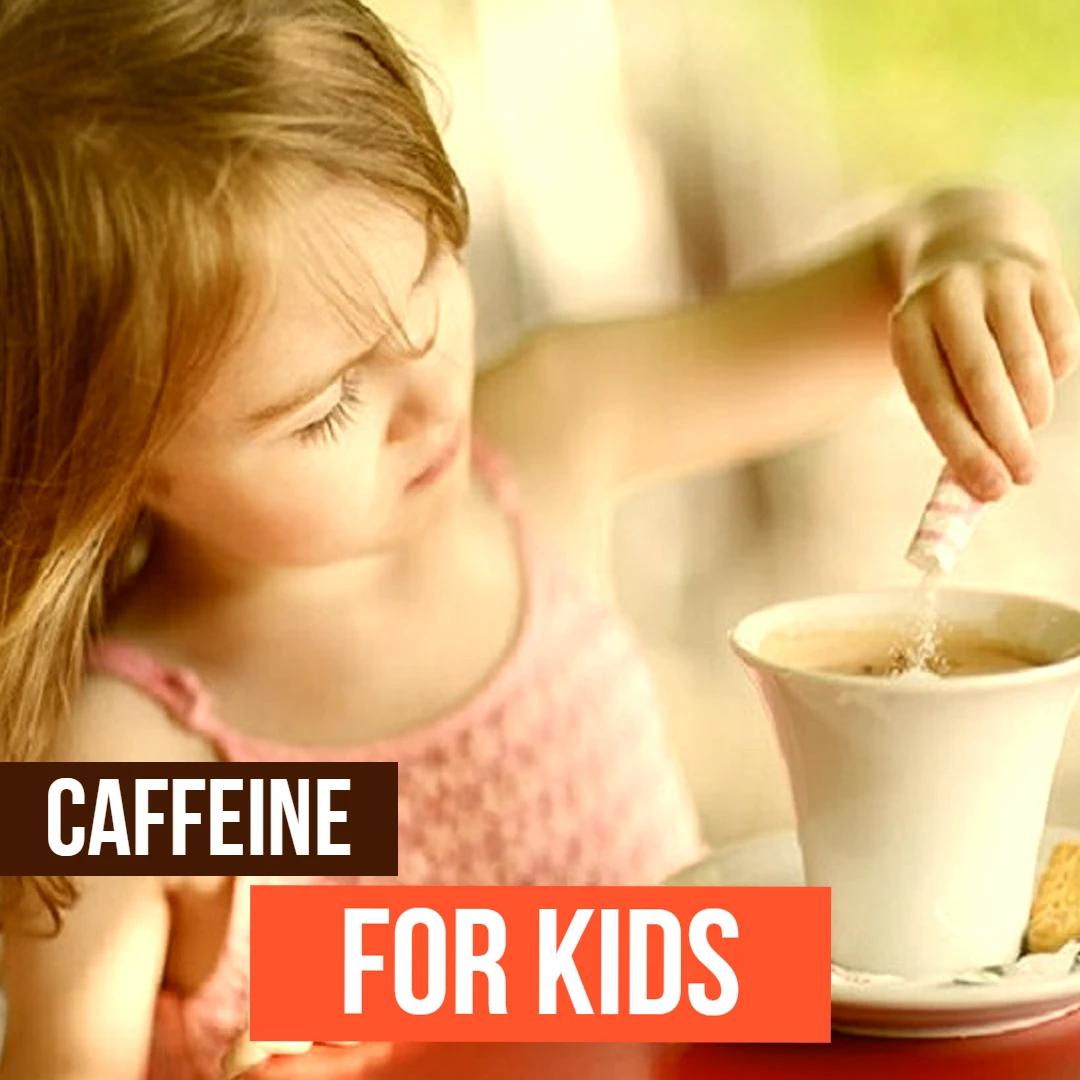Effects Of Caffeine on children

The effects of caffeine on kids are not fully understood. In adults, caffeine can cause insomnia, anxiety, and an increased heart rate. However, the effects of caffeine in kids are not fully understood.
While caffeine can have positive effects for adults, it can have different effects on children and can be harmful in large amounts. It is important for parents to be aware of the potential risks and to monitor their children’s caffeine intake.
the effects of caffeine on children and adolescents can be more significant because their bodies are still developing. In this article, we will explore the potential risks and benefits of caffeine consumption for children and provide guidelines for safe consumption.
How does caffeine affect the body?
Caffeine works by stimulating the central nervous system, which can lead to increased alertness, energy, and concentration. It can also cause physical effects such as increased heart rate and blood pressure, as well as increased urine production.
Caffeine is absorbed by the body within an hour of consumption and has a half-life of about 4-6 hours. This means that if you consume 100 mg of caffeine, after 4-6 hours, 50 mg will remain in your body. The effects of caffeine can last for several hours and can interfere with sleep if consumed too close to bedtime.
Is caffeine safe for children?
The American Academy of Pediatrics (AAP) recommends that children and adolescents consume no more than 100 mg of caffeine per day. This is equivalent to about one 8 oz cup of coffee or two 8 oz cups of tea. It is important to note that the caffeine content of beverages and foods can vary greatly. For example, an 8 oz cup of coffee can contain anywhere from 30-180 mg of caffeine, depending on the type of bean and brewing method.
Excessive caffeine consumption has been linked to a number of negative effects in children and adolescents, including:
- Insomnia and sleep disturbance
- Anxiety and restlessness
- Stomach aches and other digestive issues
- Rapid heart rate and increased blood pressure
- Increased risk of bone fractures
- Dehydration
It is also worth noting that caffeine can be addictive and can lead to withdrawal symptoms when stopped abruptly. These symptoms can include headache, fatigue, and irritability.
Risks of caffeine consumption for children
In addition to the potential negative effects on physical and mental health, caffeine consumption can also have other risks for children. For example, energy drinks, which are often high in caffeine and other stimulants, have been linked to a number of adverse effects in children and adolescents, including heart problems and seizures.
Energy drinks are not recommended for children and adolescents due to the high levels of caffeine and other stimulants they contain. In addition, the AAP advises against giving energy drinks to children and adolescents due to the potential for overconsumption and the lack of evidence on their long-term effects.
Benefits of caffeine for children
While there are potential risks to caffeine consumption for children, there may also be some potential benefits. For example, caffeine has been shown to improve physical performance and endurance in adults, and it is possible that it may have similar effects in children. However, more research is needed to determine the long-term effects of caffeine on physical performance in children.
Tips for safe caffeine consumption in children
If you choose to allow your child to consume caffeine, it is important to do so in moderation and to be aware of the potential risks. Here are a few tips for safe caffeine consumption in children:
- Limit caffeine intake to no more than 100 mg per day.
- Avoid giving energy drinks to children and adolescents.
- Be aware of the caffeine content of beverages and foods.
- Avoid giving caffeine to children close to bedtime to avoid interference with sleep.
- Monitor your child’s caffeine intake and be aware of the potential for addiction.
- Encourage your child to drink plenty of water to help prevent dehydration.
Daily limits on caffeine for kids
- caffeine for kids 4 to 6 year old: 45 mgs (about a half cup of coffee)
- caffeine for kids 7 to 9 year old: 62.5 mgs
- caffeine for kids 10 to 12 year old: 85 mgs
- caffeine for Adolescents: 85 – 100 mgs
Effects of Caffeine on Children’s Health
Consuming caffeine can cause several physical and mental effects in children. These effects can include:
- Increased heart rate and blood pressure: Caffeine can stimulate the cardiovascular system and cause an increase in heart rate and blood pressure. This can be especially concerning for children with underlying heart conditions.
- Insomnia: Caffeine can disrupt sleep patterns and cause difficulty falling or staying asleep. This can lead to tiredness and difficulty concentrating during the day.
- Dehydration: Caffeine is a diuretic, which means that it increases the production of urine and can cause dehydration. This can be especially concerning for children who are physically active and need to stay hydrated.
- Stomach issues: Caffeine can cause stomach irritation and can contribute to digestive problems such as acid reflux and diarrhea.
- Increased anxiety and restlessness: Caffeine can stimulate the central nervous system and cause feelings of anxiety and restlessness. This can be especially concerning for children who already struggle with anxiety or have ADHD.

In addition to coffee, caffeine is present in tea (48 mg per 8 ounces), caffeinated soda (37 mg per 12 ounces), hot chocolate (10 mg per 12 ounces), and chocolate (10-30 mg per 1.5 oz). It’s also added to a variety of sports products and energy drinks.
A 7-year-old child is not old enough to drink coffee. The caffeine in coffee may cause problems with the heart, blood sugar, and sleep.
The World Health Organization recommends that children should not have any caffeinated drinks until they are at least 3 years old. Coffee contains caffeine and can affect a child’s health in many ways.
How does caffeine affect children?
The effects of caffeine on children can be more significant because their bodies are still developing. Caffeine can have both positive and negative effects on children, depending on the amount consumed. In small amounts, caffeine can improve alertness and concentration, but in larger amounts it can cause insomnia, anxiety, and stomach aches. It can also lead to physical effects such as increased heart rate and blood pressure, as well as increased urine production.
Is caffeine safe for children?
The American Academy of Pediatrics (AAP) recommends that children and adolescents consume no more than 100 mg of caffeine per day. This is equivalent to about one 8 oz cup of coffee or two 8 oz cups of tea. It is important to note that the caffeine content of beverages and foods can vary greatly. For example, an 8 oz cup of coffee can contain anywhere from 30-180 mg of caffeine, depending on the type of bean and brewing method. Excessive caffeine consumption has been linked to a number of negative effects in children and adolescents, including insomnia, anxiety, stomach aches, rapid heart rate, increased blood pressure, and increased risk of bone fractures.
Can caffeine cause addiction in children?
Caffeine can be addictive and can lead to withdrawal symptoms when stopped abruptly. These symptoms can include headache, fatigue, and irritability. It is important to monitor caffeine intake in children and to be aware of the potential for addiction.
Are energy drinks safe for children?
Energy drinks are not recommended for children and adolescents due to the high levels of caffeine and other stimulants they contain. In addition, the AAP advises against giving energy drinks to children and adolescents due to the potential for overconsumption and the lack of evidence on their long-term effects. Energy drinks have been linked to a number of adverse effects in children and adolescents, including heart problems and seizures.
Can caffeine improve physical performance in children?
Caffeine has been shown to improve physical performance and endurance in adults, and it is possible that it may have similar effects in children. However, more research is needed to determine the long-term effects of caffeine on physical performance in children.
Read More:
Contents
- How does caffeine affect the body?
- Is caffeine safe for children?
- Risks of caffeine consumption for children
- Benefits of caffeine for children
- Tips for safe caffeine consumption in children
- Daily limits on caffeine for kids
- Effects of Caffeine on Children’s Health
- How does caffeine affect children?
- Is caffeine safe for children?
- Can caffeine cause addiction in children?
- Are energy drinks safe for children?
- Can caffeine improve physical performance in children?





